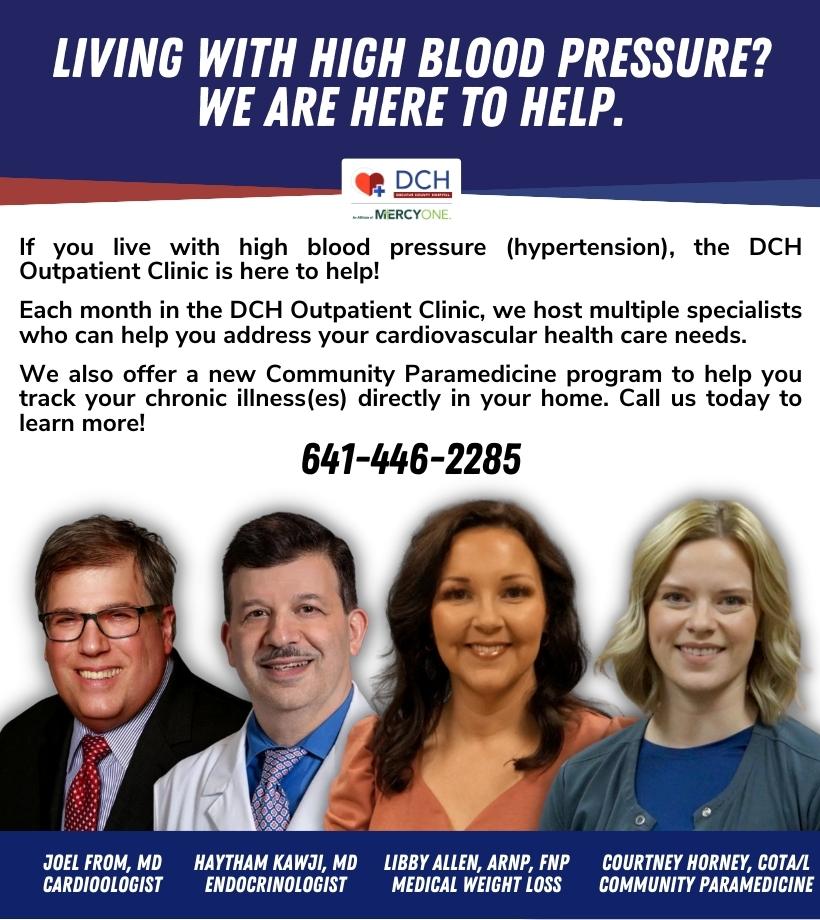High Blood Pressure Education Month
May 31, 2023
Hypertension or High Blood Pressure increases your risk of dangerous health conditions like heart attack, stroke, and heart failure. Lifestyle changes such as increasing physical activity might lower your risk for developing hypertension.
If you are making efforts to adjust your lifestyle, but still live with high blood pressure, we are here to help. Each month in the DCH Outpatient Clinic, we host multiple specialists who can help you address your cardiovascular health care needs.
Dr. Joel From, with the Iowa Heart Center, visits the DCH Outpatient Clinic each month to offer clinical cardiology services. Dr. From helps patients with the diagnosis and management of cardiovascular disease including consultations, cardiac and vascular testing, and follow-up visits to assess your progress. In addition to on-site visits with Dr. From twice each month, Sandy Hall, ARNP, is available for telehealth cardiology appointments. Patients who utilize this service will continue to visit the DCH Outpatient Clinic in person, and our staff will seamlessly connect them with Sandy using a video conference connection. On-site cardiac equipment will allow our staff to partner with Sandy to gather cardiac data, and transmit that information to inform health care decisions.
If you live with a condition such as diabetes that may affect your blood pressure, our Endocrinologist, Dr. Haytham Kawji is on-site to help four (4) days each month. Dr. Kawji specializes in treating chronic conditions that may cause you to have high blood pressure.
To help you make lifestyle change that may lower your blood pressure, our Medical Weight Loss Clinic provider, Libby Allen, can help you address obesity and obesity-related conditions. In the Medial Weight Loss Clinic, our goal is to help you make life-long changes. While diets can provide a short-term benefit to kick start weight loss and lowering your blood pressure, overeating is not the only cause of these conditions. A combination of physical health, mental health, genetics, and certain medications may all affect your weight and blood pressure. In this clinic, Libby can work with you to address a wide range of issues and develop a lifestyle and medication plan to address your concerns.
Millions of Americans have high blood pressure, but many don’t realize it or aren’t keeping it at a healthy level. If you learn that you have hypertension, and need help managing your chronic illness, our newest program is designed just for you. Our Community Paramedicine Program Coordinator is Courtney Horney, a Certified Occupational Therapy Assistant (COTA/L). She works with our Paramedics to line up in-home visits to Decatur County residents living with chronic illnesses, including hypertension. These Paramedics can help you with 1) vitals tracking, 2) education on specific diseases or chronic conditions, 3) safety checks in the home environment, 4) medication management and education, 5) symptom tracking, and 6) scheduling specialty health care appointments when needed, or assisting with scheduling primary care appointments with the your provider.
For most adults, healthy blood pressure is 120/80 millimeters of mercury or less. Blood pressure consistently above 130/80 millimeters of mercury increases your risk for heart disease, kidney disease, eye damage, dementia and stroke. Your doctor might recommend lowering your blood pressure if it’s between 120/80 and 130/80 and you have other risk factors for heart or blood vessel disease.
High blood pressure is often “silent,” meaning it doesn’t usually cause symptoms but can damage your body, especially your heart over time. While you can’t control everything that increases your risk for high blood pressure – it runs in families, often increases with age and varies by race and ethnicity – there are things you can do. Consider these tips from experts with the National Heart, Lung, and Blood Institute’s (NHLBI) The Heart Truth program:
Know Your Numbers. Everyone ages three (3) and older should get their blood pressure checked by a health care provider at least once a year. Expert advice: 30 minutes before your test, don’t exercise, drink caffeine or smoke cigarettes. Right before, go to the bathroom. During the test, rest your arm on a table at the level of your heart and put your feet flat on the floor. Relax and don’t talk.
Eat Healthy. Follow a heart-healthy eating plan, such as NHLBI’s Dietary Approaches to Stop Hypertension (DASH). For example, use herbs for flavor instead of salt and add one fruit or vegetable to every meal.
Move More. Get at least 2 1/2 hours of physical activity each week to help lower and control blood pressure. To ensure you’re reducing your sitting throughout the day and getting active, try breaking your activity up. Do 10 minutes of exercise, three times a day or one 30-minute session on five separate days each week. Any amount of physical activity is better than none, and all activity counts.
Aim for a Healthy Weight. If you’re overweight, losing just 3-5% of your weight can improve blood pressure. If you weigh 200 pounds, that’s a loss of 6-10 pounds. To lose weight, ask a friend or family member for help or to join a weight loss program with you. Social support can help keep you motivated.
Manage Stress. Stress can increase your blood pressure and make your body store more fat. Reduce stress with meditation, relaxing activities or support from a counselor or online group.
Have a Healthy Pregnancy. High blood pressure during pregnancy can harm the mother and baby. It also increases a woman’s risk of having high blood pressure later in life. Talk to your health care provider about high blood pressure. Ask if your blood pressure is normal and track it during and after pregnancy. If you’re planning to become pregnant, start monitoring it now.
Stop Smoking. The chemicals in tobacco smoke can harm your heart and blood vessels. Seek out resources, such as smoke free hotlines and text message programs that offer free support and information.
Work with Your Doctor. Get help setting your target blood pressure. Write down your numbers every time you get your blood pressure checked. Ask if you should monitor your blood pressure from home. Take all prescribed medications as directed and keep up your healthy lifestyle. If seeing a doctor worries you, ask to have your blood pressure taken more than once during a visit to get an accurate reading.
To learn more about all the services available to help you manage your blood pressure, please visit www.decaturcountyhospital.org/clinics, or call 641-446-2285 to schedule your consultation with one of our experts.


